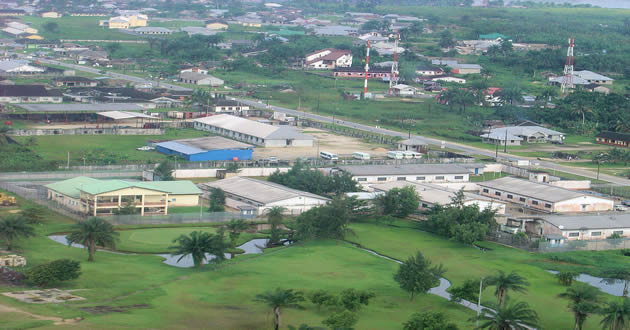
Eket Town
Latitude: 4.6423 Lat (DMS) 4° 38' 32N
Longitude: 7.9244 Long (DMS) 7° 55' 28E
Elevation (Feet): 830
Population Est. (2006): 255069
Zip Code: 524101
History:
Eket is popularly known as “Idong Afianwe”. The name is anchored on two major reasons: First, there is a town in Switzerland called “Eket”.
This buttressed the fact that the first person to write on Eket was a Swiss National. Second, Eket was the hub of political and economic activities just as Calabar and Lagos. This led to the heavy presence of White colonial administrators and business men in Eket.
In fact, there is an elevated land inhabited by the whites, which is still referred to as “Abad Okkokoro” or “Abad Afianwe” located at Ikot Ibiok. Because of this Long interaction with the White men, Eket people always look neat and knowledgeable and thus, attracted the name “NDITO Mfianwe”.
Besides, Eket people are enterprising, sociable, accommodating and hospitable. They are a special breed of people imbued with love and bounded by strong ties of common aspiration.
Eket Local Government Area is an off-shoot of Qua Iboe District of 1885 administered by Vice Consul Whitehouse. The Qua Iboe District embrace what is today most part of Akwa Ibom State including Esit Eket, Onna, Ibeno, Nsit Ubium, Etinan, Abak, Etim Ekpo, Oron, Mbo, Okobo, Urue Offiong/Oruko, Udung Uko, etc. between 1893 and 1899, Eket became one of the consular past with the first District Consul appointed 1898.
Eket is the second largest city in Akwa Ibom State, Nigeria. The name also refers to the indigenous ethnic group of the region and to their language, the city itself, an industrial city that in recent years has become a conurbation engulfing separate villages.
By 1905, area was reduced to Oron, Eket, Esit Eket, and some of Nsit Ubium. Although the British signed a treaty with Eket people on September 1884, British administration really started in 1885 by the Vice Consul Whitehouse who later became Consul in Calabar.
Eket continued to be a District Council until after the Second World War, when it was made a division with a wide area of authority.
Eket has existed as an administrative headquarters for more than one hundred years. When the then Head of State, Col Yakubu Gowon, created 12 states in 1967, Eket became one of of the ten division in the then South Eastern State. With the 1976 Local Government Reforms, Eket became one of thr 301 Local Government Local Government Areas in Nigeria.
The people of Eket are believed to have migrated from Cameroon during the great movement of the Bantu stock in Africa. The migration brought the people to the location around the mouth of Cross River, which they claim as their first settlement with Oron people along the estuary of Cross River. The movement continued along the coast into the Qua Iboe River territory, their present location.
Eket people had earlier contact with the outside world long before the slave trade era. In 1850, European trading companies like UAC, PZ and GB Olivant, French and Germen Trading Stores were established in Eket. And 1887, Rev. Samuel Alexander Bill landed at Ukpenekang (Ekang’s lace, which was then a fishing settlement in Eket) by the sea and established Qua Iboe Church of Nigeria and converted Eket people to Christianity.
Eket is bounded on the North by Nsit Ubium Local Government Area, on the west by Onna Local Government Area and on the South by Ibeno Local Government Area/Bight of Bonny.
Culture
Eket is blessed with a rikch and enviable cultural heritage. “Ekid”, the language spoken by Eket and Esit Eket Local Government Area, conveys a unique culture and identity to the people. Eket has a plethora of cultural display such as Ekong, Mbok, Obon, Ekeng, Ibang-Isong, Akata, Nnabo, Ibem, Ekpe Obon, Nkuho, Ekpe, Ntak unaidi, etc.
There are also many cultural practices and ceremonials prevalence in Eket and which have a defined pattern. These included burial ceremony, coronation, marriage, status initiation, land-holding, extended family system, harvesting of palm fruits, births land child naming ceremony.
Although Eket is one of those communities that embraced Christianity early, traditional religious practices still prevalent suc as the Supreme God (Abasi Anyong), while some people believe in worship deities (Edoho-“Abasi Isong”).
The physical relief of Eket Local Government area is basically flat, though with some marshy river washed soils around the banks of Qua Iboe River.
Eket Local Government Area falls within the tropical zone whose dominant vegetarian is the green foliage of trees/shrubs and the oil palm tree belt. The Local Government has two seasons: wet season and the dry season.
There are tourist attractions in the local government area that are privately managed. They include hotel, gardens and parks. These and many more have made the area to play host to the international oil giant-ExxonMobil.
In Eket, there are abundantly deposit of crude oil and clay. Forest resources includes timber and palm produce. The area is also noted for sea-food production, farm crops ranging from yam, cassava, cocoyam, plantain to maize and vegetable.
Commerce: traditionally, Eket people are fisher men, hunters, farmers, weavers etc.
Banks in Akwa Ibom
Brief History of Akwa Ibom
Business and Economy
Festivals and Carnivals
General and Teaching Hospitals
Hotels and Guest Houses
Local Governments & LCDAs
Akwa Ibom State Ministries Agencies and Parastatals
Police Stations
Popular Markets
Prominent Towns
Restaurants, Bars, Night Clubs
Shopping Malls
Akwa Ibom State Executive Council
Tourist Attractions
Traditional Rulers




